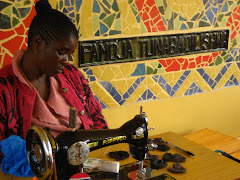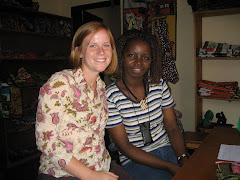 From Lucy's vantage point in an armchair in my parents' living room, she had a direct view of the kitchen sink where my father stood, both hands deep in a sink full of dirty plates and bowls. We'd just enjoyed a delicious dinner together with the Sankofa team and DC Committee, but 20 people make a mound of dishes, and he'd taken on the task of dismantling it. Lucy was amazed. She called me over and whispered, "There are so many women in this house, and he is doing the dishes." My mom and I smiled, and we all joked about the strangeness of American men who do housework and how different things are in our cultures.
From Lucy's vantage point in an armchair in my parents' living room, she had a direct view of the kitchen sink where my father stood, both hands deep in a sink full of dirty plates and bowls. We'd just enjoyed a delicious dinner together with the Sankofa team and DC Committee, but 20 people make a mound of dishes, and he'd taken on the task of dismantling it. Lucy was amazed. She called me over and whispered, "There are so many women in this house, and he is doing the dishes." My mom and I smiled, and we all joked about the strangeness of American men who do housework and how different things are in our cultures.
The weeks I spent with the Sankofa team were full of these moments - amusing, simple, and sometimes sobering - as the Amani family opened share its homes and communities to our friends from Africa. Together we explored the world of line dancing, hauled baggage, hung out on runways, steamed costumes, and piled into countless vans. We prayed together for families far away and comforted one another as in loneliness and exhaustion. We laughed and ate till we thought we could bare it more. We feasted on good things.
 The Sankofa US Tour was unlike any other experience the Amani family has shared before. It was new for all of us, even the Americans traveling with the team who constantly improvised our way through new circumstances. Yet after spending the past four years sharing about Amani in the United States, my eyes were open to new depths of its ability to draw people together and facilitate meaningful bonds of peace, hope, and encouragement. In Florida, Texas, Virginia, Maryland, and DC, I heard the Amani women boldly share their personal experiences of sorrow and renewal with a striking blend of meekness and conviction. (Unfortunately, I was unable to be in North Carolina with them but heard great reports about it.)
The Sankofa US Tour was unlike any other experience the Amani family has shared before. It was new for all of us, even the Americans traveling with the team who constantly improvised our way through new circumstances. Yet after spending the past four years sharing about Amani in the United States, my eyes were open to new depths of its ability to draw people together and facilitate meaningful bonds of peace, hope, and encouragement. In Florida, Texas, Virginia, Maryland, and DC, I heard the Amani women boldly share their personal experiences of sorrow and renewal with a striking blend of meekness and conviction. (Unfortunately, I was unable to be in North Carolina with them but heard great reports about it.) Naturally, I was particularly grateful for the meaningful experiences we had together in the DC area. My experiences and relationships through Amani over the years have given me vision for hope and peace in DC. The Sankofa team brought fresh particularity to that reality. Goretti shared weighty words of God’s presence with us in sorrow at a gathering of senior citizens at Central Union Mission. Mary K. led a hundred elementary students at the E.W. Stokes School in NE DC in a raucous round of old spirituals. Stella shared with the students – many of whom are recent immigrants themselves - about her experience growing up as a refugee.
Naturally, I was particularly grateful for the meaningful experiences we had together in the DC area. My experiences and relationships through Amani over the years have given me vision for hope and peace in DC. The Sankofa team brought fresh particularity to that reality. Goretti shared weighty words of God’s presence with us in sorrow at a gathering of senior citizens at Central Union Mission. Mary K. led a hundred elementary students at the E.W. Stokes School in NE DC in a raucous round of old spirituals. Stella shared with the students – many of whom are recent immigrants themselves - about her experience growing up as a refugee.  Audience members at the show in Springfield told me in wide-eyed wonder that the event was far beyond what they expected in quality and beauty. In a region buzzing with international news, whose pulse beats with world-change and power-wielding, the women of Amani shared truth about the source of hope and peace. Their presence grounded me and still reminds me that this is a message we so need here.
Audience members at the show in Springfield told me in wide-eyed wonder that the event was far beyond what they expected in quality and beauty. In a region buzzing with international news, whose pulse beats with world-change and power-wielding, the women of Amani shared truth about the source of hope and peace. Their presence grounded me and still reminds me that this is a message we so need here.Now the Sankofa team has returned to homes in Kenya, Rwanda, Burundi, and throughout the US. As we do so, the richness of these weeks will continue to unfold in our lives and relationships. We continue to look back and walk forward. I’m inspired for the work ahead of us in DC to do just that.
Amani's Kenya Country Director Mary Maina concluded each Sankofa show with the following words. They are timely and sum up well the message of Sankofa that I carry into the days ahead:
"At Amani, we are discovering hope for the future: a peace that comes from Jesus Christ. As we are learning to thrive amidst sorrow, we entreat you to join us in this journey of learning from the past and walking boldly toward the future. Despite the uncertainties that the future holds for all of us, our families, and our countries, may we leave this place tonight knowing that we can be ambassadors for a peace that transforms."
You can watch the show online thanks to Forest Hill Church, our hosts in Charlotte, NC. Check it out at: http://foresthill.lightcastmedia.com/console.php?u=3037&c=697757024.
Note: Due to a technical glitch, the narration pieces before each of the three sections of the show are not included in this recording.
Below are a few more images from Sankofa courtesy of Jillian Pichocki (www.jillianpichocki.com) and Brian Tropiano (www.briantropianophoto.com).








